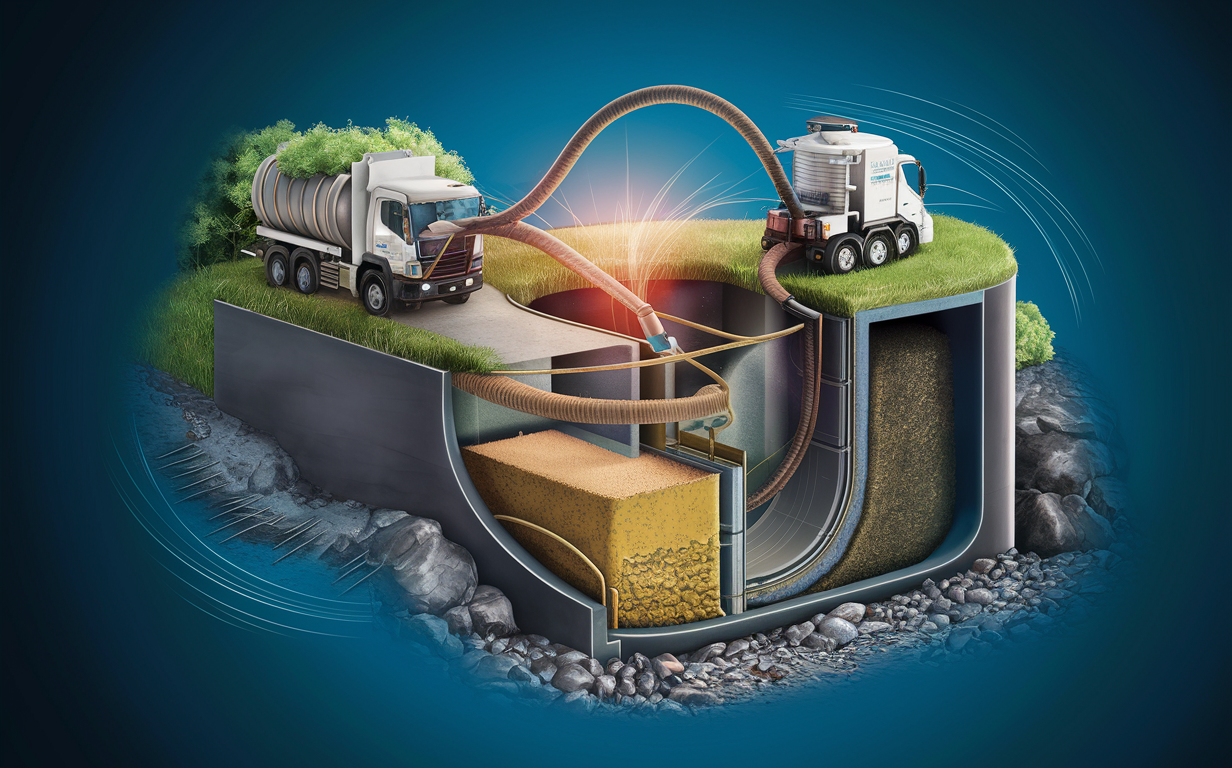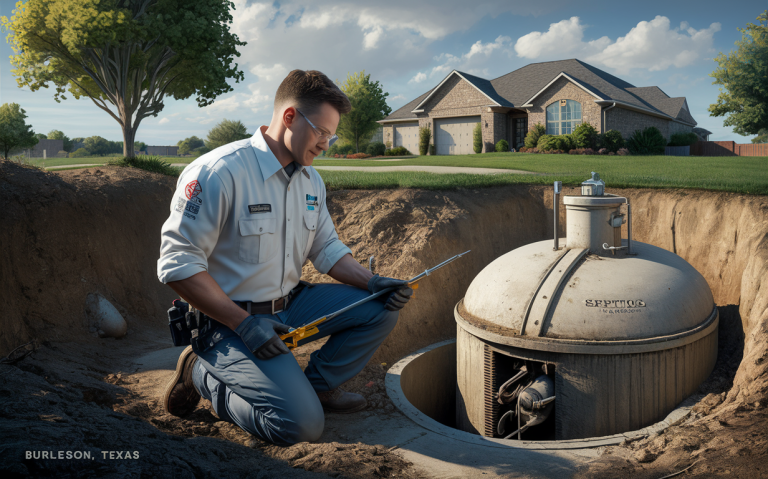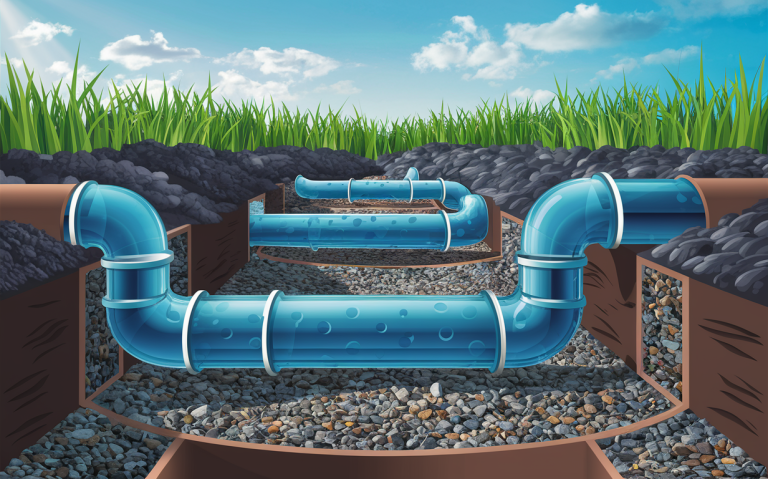Septic Pumping Frequency and Benefits: Essential Guide
Learn about septic pumping frequency and benefits. Discover how regular maintenance can prevent costly repairs and extend your system’s lifespan. Call Texway Wastewater Services today!
Knowing the right septic pumping frequency can save you money and prolong the life of your septic system. A well-maintained septic system ensures that you avoid costly repairs and unpleasant backups. By understanding when to pump and the benefits of regular maintenance, you can keep your system running smoothly.
Key Takeaway
- Septic tanks should generally be pumped every 3-5 years.
- Factors like household size, tank size, and wastewater usage affect how often pumping is needed.
- Regular pumping prevents system failures, prolongs the system’s lifespan, and ensures efficiency.
- An efficiently running septic system protects property value and the environment.
Determining the Right Septic Pumping Frequency
The frequency of septic tank pumping depends on various factors such as the size of the household, the size of the tank, and the amount of wastewater generated. Here’s how you can determine how often you should pump your septic tank:
Household Size and Wastewater Generation
The more people living in a home, the more wastewater is produced. Typically, a larger household will require more frequent pumping.
Tank Size
Larger tanks can hold more waste, thus requiring less frequent pumping compared to smaller tanks.
Water Usage Habits
High water usage from daily activities like laundry, showers, and dishwashing can fill up the tank faster, necessitating more frequent pumping.
Benefits of Regular Septic Tank Pumping
Regular septic tank pumping offers multiple benefits for homeowners. Let’s explore these advantages:
Prevents System Failures
Regular pumping helps prevent system failures and backups, which can cause unpleasant odors, health hazards, and property damage.
Extends System Lifespan
Routine maintenance can significantly extend the lifespan of your septic system, saving you from costly replacements.
Ensures Optimal Performance
A well-maintained septic system operates more efficiently, ensuring that wastewater is properly treated and disposed of.
Protects Property Value
Maintaining your septic system protects the value of your property. A failing septic system can lower property values and deter potential buyers.
Environment Protection
Proper septic maintenance prevents harmful contaminants from leaking into the environment, protecting local water sources and ecosystems.
Signs Your Septic Tank Needs Pumping
It’s crucial to recognize the signs that your septic tank needs pumping. Ignoring these signs can lead to system failures and costly repairs.
Slow Drains and Toilets
One of the first signs of a full septic tank is slow draining sinks, showers, and toilets.
Unpleasant Odors
Foul odors around your property, especially near the drain field, indicate that your septic tank needs attention.
Pooling Water
Pooling water around the drain field area can signal that your septic tank is full or that there is a blockage in the system.
Lush, Green Grass Over Drain Field
While green grass is usually a good sign, an unusually lush and green area over your septic drain field could indicate a leak or overflow.
Tank Alarm
Many modern septic systems have alarms that alert homeowners when the tank needs pumping. Pay attention to this warning to avoid complications.
Best Practices for Septic System Maintenance
Regular septic tank pumping is just one part of maintaining your system. Here are some best practices to ensure your septic system remains in good condition:
Monitor Water Usage
Reduce water usage to prevent your septic system from becoming overloaded. Fix any leaks and install water-efficient fixtures.
Avoid Flushing Non-Biodegradable Items
Flush only human waste and toilet paper. Avoid flushing baby wipes, feminine hygiene products, and other non-biodegradable items.
Use Septic-Safe Cleaning Products
Choose cleaning products that are safe for septic systems to avoid killing the beneficial bacteria in your tank.
Regular Inspections
In addition to regular pumping, schedule periodic inspections to identify and address any potential issues early.
Factors Influencing Septic Pumping Frequency
| Factor | Impact on Pumping Frequency |
|---|---|
| Household Size | Larger households produce more wastewater, needing more frequent pumping. |
| Tank Size | Larger tanks can hold more waste, requiring less frequent pumping. |
| Water Usage Habits | High water usage fills the tank faster, requiring more regular pumping. |
| Presence of Garbage Disposal | Using a garbage disposal increases solid waste in the tank, necessitating more frequent pumping. |
Common Septic System Issues and Solutions
| Issue | Cause | Solution |
|---|---|---|
| Slow Drains | Full septic tank or clogged pipes | Schedule pumping; check for blockages |
| Unpleasant Odors | Full tank or malfunctioning system | Pump the tank; inspect system components |
| Pooling Water | System overflow or clogged drain field | Pump the tank; clear drain field blockages |
| Lush, Green Grass | Leaking tank or overflow | Inspect and repair leaks; consider pumping |
| Tank Alarm | Full tank | Schedule immediate pumping |
Myths and Misconceptions About Septic Pumping

There are several myths and misconceptions about septic system maintenance that can lead to neglect and system failure. Here are a few common myths debunked:
Myth: Septic Tanks Never Need Pumping
Some people believe that once a septic tank is installed, it never needs maintenance. This is false. Regular pumping is crucial to prevent overflows and system failures.
Myth: Additives Can Replace Pumping
While some products claim to eliminate the need for pumping, they are not a substitute for regular maintenance. Additives can sometimes disrupt the natural bacterial balance in the tank.
Myth: It’s Cheaper to Fix Problems Than Prevent Them
Preventive maintenance, including regular pumping, is far less expensive than repairing or replacing a failed septic system.
Facts About Septic Pumping Frequency And Benefits
- Septic pumping is the process of removing sludge and scum from a septic tank to maintain its efficiency and prevent system failure. The frequency of septic pumping depends on various factors, including the size of the tank, the number of people using it, and the amount of wastewater generated.
- According to the EPA, septic tanks should be inspected at least every three years and pumped as needed, which could be every three to five years.
- The EPA also recommends pumping more frequently if the system is used heavily, such as in a household with a large number of people or a business.
- Regular septic pumping offers several benefits, including:
- Improving system efficiency: By removing excess sludge and scum, the septic system can function more effectively, reducing the need for costly repairs or replacements.
- Reducing environmental impact: A well-maintained septic system is less likely to leak or release contaminants into the environment, protecting groundwater and surface water sources.
- Preventing health risks: Regular pumping helps prevent the buildup of harmful bacteria and other contaminants that can pose health risks to people and animals.
Tips for Extending the Lifespan of Your Septic System
- Schedule Regular Pumping: Ensure your tank is pumped every 3-5 years or as needed.
- Monitor Water Usage: Install water-efficient fixtures and repair leaks promptly.
- Be Mindful of What You Flush: Only flush biodegradable waste and toilet paper.
- Use Septic-Safe Products: Choose cleaning products that won’t harm beneficial bacteria.
- Perform Regular Inspections: Check your system periodically to catch issues early.
Conclusion
Proper septic system maintenance is essential for preventing costly repairs and ensuring the longevity of your system. By understanding the right septic pumping frequency and the benefits of regular maintenance, you can keep your septic system running efficiently and protect your property value.
Don’t wait for problems to arise—schedule your septic tank pumping today and enjoy peace of mind knowing your system is in good hands.
For professional septic tank pumping and maintenance services in Burleson and Johnson County, Texas, trust Texway Wastewater Services. With our experienced team and high-capacity pump trucks, we are equipped to handle all your septic needs. Call us at (817) 889-4007 or schedule your service online today!






 Texway Wastewater Services is a septic, wastewater, and excavation company based out of Burleson, Texas and serving the surrounding areas. We specialize in
Texway Wastewater Services is a septic, wastewater, and excavation company based out of Burleson, Texas and serving the surrounding areas. We specialize in